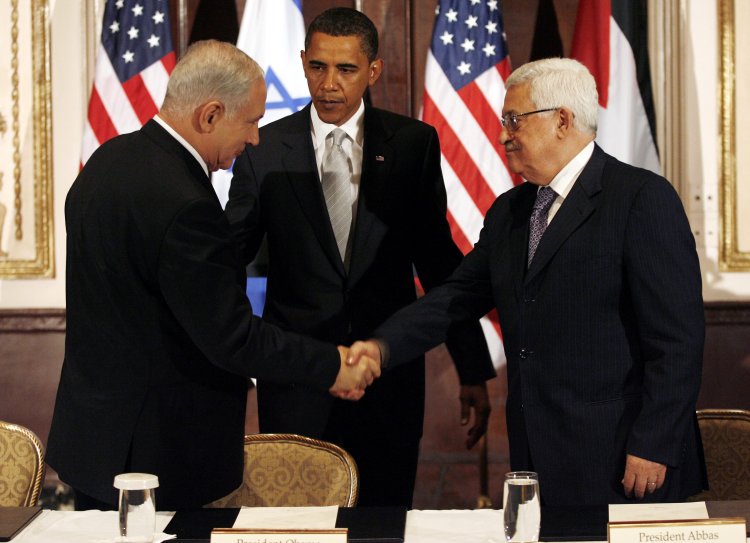![]()
Fri, Oct 01, 2010 | The Rubin Report | By Barry Rubin
Why Netanyahu Rejected a US Offer to Extend the Construction Moratorium
Obama Administration tells Israel: make us look good for election and we will reward you (a little bit)
Contents of a White House letter have been published saying what the Obama Administration will offer Israel if it extends the moratorium on building inside West Bank settlements for two months. The specific proposals reveal again how the White House doesn’t seem to understand the situation, or perhaps is thinking of something other than the Israel-Palestinian peace process.
Prime Minister Benjamin Netanyahu couldn’t continue the freeze because there isn’t enough support in his coalition for doing so. Thus, minor U.S. offers don’t change that fact in any way. Moreover, the main underlying problem is lack of confidence that the Palestinian Authority (PA) wants peace with Israel, is willing to compromise, or will implement commitments in future. As you read this, keep in mind all of the problems I’ve written about which Israel must keep in mind in making any peace agreement.
When we consider the specifics, then, the U.S. offer isn ‘t relevant. But there are more problems:
First, the administration offers not to seek an extension of a two-month freeze. Why two months, why not three or four? Why not two weeks?
Hmm, readers, what is happening within two months? The U.S. election! The implication is that the Obama Administration is offering Israel the following basic deal: Make us look good until the vote and we will give you a pay-off.
That’s it. Because the only alternative view is that the United States believes that the once-every-two-week talks will make such dramatic progress in two months that both Israel and the Palestinians will be on the verge of peace or an end to the freeze won’t matter.
Is that credible? No. And so when press reports say that the White House is angry that Prime Minister Benjamin Netanyahu has rejected the offer we can well understand why this is so. It certainly isn’t going to pressure the PA to give in, which is the other alternative. The collapse of the peace talks on the verge of the November elections don’t make it look good while the PA walking out in December won’t matter in terms of American politics.
The Obama Administration cannot bash Israel between now and the elections but it might seek to get revenge in 2011.
Back to the U.S. offer. Second, the United States offers to support measures to prevent the smuggling of weapons and terrorists into Israel after a Palestinian state is established. This is interpreted as allowing for Israeli forces to stay in the Jordan valley and guard the border with Jordan for several years.
This is nice but Israel knows that the PA would never agree to this idea and that the U.S. government isn’t going to do a lot of arm twisting to get it to change its position. Moreover, while Israeli leaders in the past have spoken about maintaining a security zone with Jordan, that was always linked with holding on to the Jordan Valley’s territory. The U.S. proposed temproary idea would set up a situation in which an isolated Israeli force would be subject to attack by terrorists on a regular basis, with international condemnation when it had to intercept or kill terrorists.
While not exactly the same thing, the United States and the “international community” promised to stop cross-border weapons’ smuggling into Lebanon in 2006 and four years later not a single weapon has been intercepted. True, in this case Israeli troops would be doing the work but the skepticism of their getting international support remains.
Third, the letter promises the U.S. government would veto any UN Security Council resolution against Israel for the next year. This is insulting. Historically, the United States has watered-down, blocked, or vetoed such resolutions. So this “concession” in fact takes back a previous policy. It signals to Israeli leaders that the current administration isn’t exactly reliable. And, of course, it suggests that after the year is over Washington will not veto such resolutions, a big step backward.
Fourth, the administration pledges to talk with Israel and Arab states about a, “regional security architecture.” Wow, that can be expected to yield precisely…zero.
And finally, the United States will sell more weapons to Israel after there is a peace agreement and the creation of a Palestinian state. Well, that’s pretty obvious, isn’t it? Again, suggesting that this would happen if Israel freezes construction for two months also simultaneously suggests that it won’t happen otherwise. Like the veto point, it actually withdraws something Israel was previously expecting.
According to media reports, Prime Minister Benjamin Netanyahu politely pointed out that when the United States originally demanded the freeze it promised that it would secure concessions from Arab states. This didn’t happen. It also promised that the Palestinians would be responsive and fulfill their commitments. That didn’t happen either. Indeed, I should point out, they refused to negotiate until the last minute and then did so mainly to get the freeze extended still further without any concession or advancing the negotiations on their part.
Netanyahu’s right. But it isn’t his job to point out what I’m telling you couldn’t be more obvious: this is a deal motivated by domestic political benefit for the administration, not the strategic interests of the United States or the cause of peace.
About the author,
Barry Rubin is director of the Global Research in International Affairs (GLORIA) Center and editor of the Middle East Review of International Affairs (MERIA) Journal. His latest books are The Israel-Arab Reader (seventh edition), The Long War for Freedom: The Arab Struggle for Democracy in the Middle East (Wiley), and The Truth About Syria (Palgrave-Macmillan). For the website of the GLORIA Center go here and for his blog, Rubin Reports, go here.



 RSS
RSS











Why Netanyahu Rejected a US Offer to Extend the Construction Moratorium | #Israel #US #peace #abbas http://j.mp/92axEb
RT @CrethiPlethi: Why Netanyahu Rejected a US Offer to Extend the Construction Moratorium | #Israel #US #peace #abbas http://j.mp/92axEb
[…] So this is an example of incompetence on the part of the Obama Administration, though I’ve also pointed out how part of it is due to an element of cynical domestic political calculation. […]